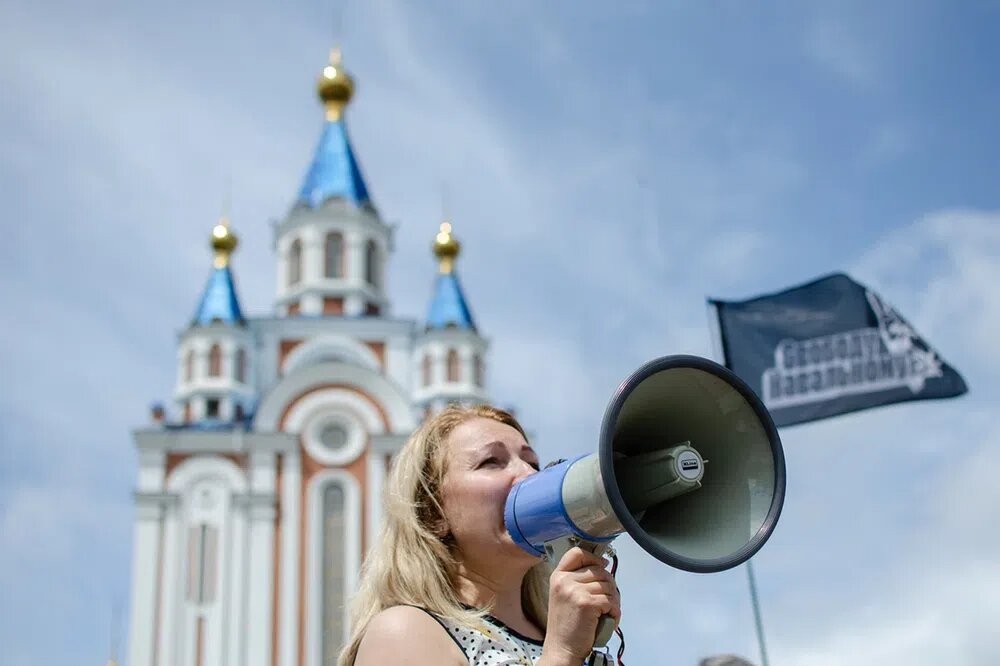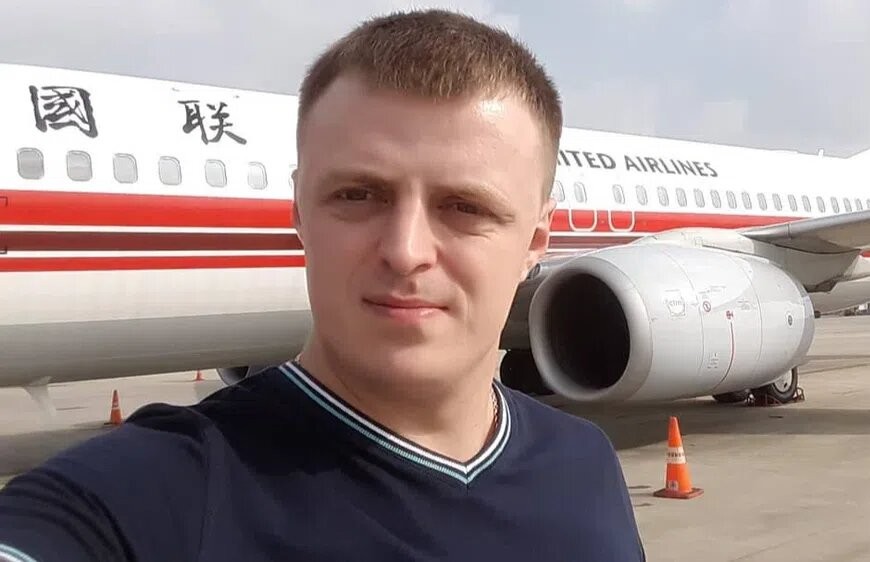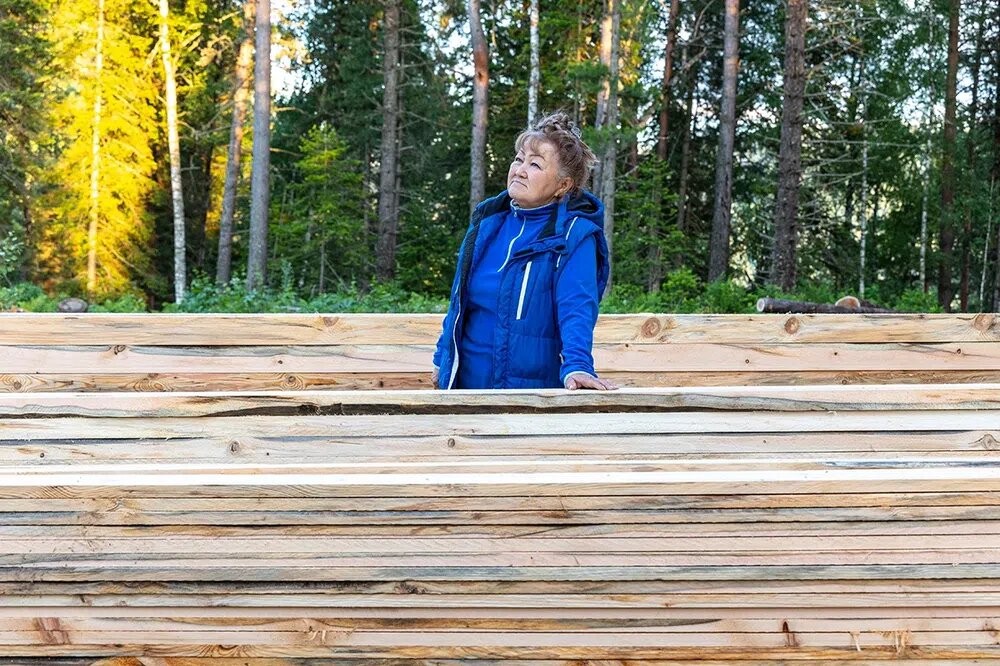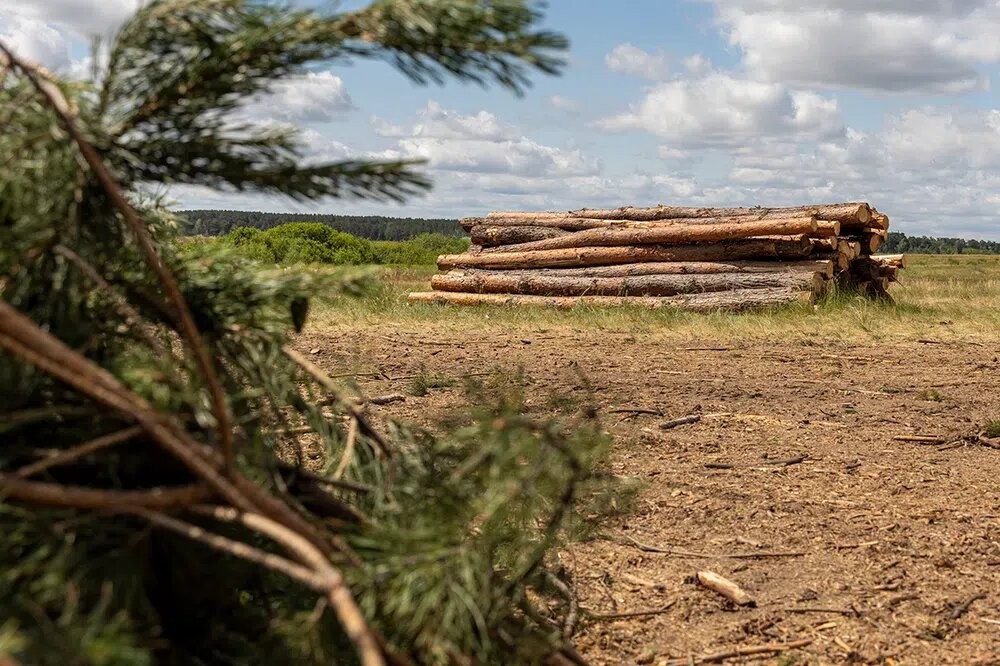
Photo: Maxim Polyakov / "7x7"
Here what’s in store for you this week:
- A year ago the Khabarovsk protests launched the largest regional uprising in Russia’s modern history. It has inspired many protest movements across the country and in the neighborhood. But few have heard about it in the recent months? This week we explain why in a special dispatch;
- We also profile Russian hostages of the Belarusian dictator and why the Kremlin allows Lukashenka to get away with it;
- Plus, we take you to ancient Siberian forests of Altai that disappear super fast under pressure of unrestricted logging and epic forest fires fueled by climate change.
Want to get the full story? Click the links below for full-length articles in Russian.
What Has Happened to the Khabarovsk Uprising?
It hasn't happened before that a Russian provincial protest could capture the imagination of millions across the country and even folks in neighboring states. But that's precisely what the Khabarovsk uprising did in 2020. Tens of thousands of people spent months protesting the Moscow iron rule over local affairs and injustice — all amid a grueling pandemic. Then over this winter and spring, we stopped hearing from them. This week we examine what has happened to the largest regional uprising in Russian modern history.
'SILENT' CRACKDOWN ON THE PROTESTERS OVER THIS WINTER DOWNSIZED THE DISPLAY OF PUBLIC DISSENT. Compared to a police brutality fest on Moscow streets in 2019, many Russians were surprised to see a relatively peaceful and unchecked anti-government protest in Khabarovsk in 2020. Yet, the real crackdown started when folks left the streets for a winter break. Local authorities began harassing the participants en masse: random police questioning and intimidation, searches, arrests, jail terms, and draconian fines. In a special project with Syndicate-100 this week, we publish interviews with Khabarovsk protesters.
'AT THE TRIAL THEY FINED ME 150 THOUSAND RUBLES (APPROX $2K), IT WAS ABSURD,' recalls one of the harassed protesters and a local 44-year old taxi driver Anastasia Subbotnikova. 'The court hearing felt like a conveyor belt, the place of utter despair where no one could save you. They already had my sentence prepared in advance, so I went to the court with a bag full of things for my upcoming prison term,' Subbotnikova says. She spent three days in jail and got 30 hours of penal labor for participating in anti-government protests. 'After the jail term, I couldn't show up at the protests for a couple of weeks. Would just stay at home, watch live streams, and cry. But I couldn't stand things this way. I rejoined the protests, eventually,' she says defiantly. Subbotnikova is one of the few Khabarovsk residents who have restarted regular protest action in recent weeks.

Photo: Maxim Polyakov / "7x7"
ONE YEAR ON, A CORE GROUP OF LOYALISTS REMAINS ON THE STREETS. Former governor Sergei Furgal, the man at the epicenter of the uprising, remains behind bars, and the government ignored the protesters' demands. So, despite repressions, some of them renewed regular pickets — albeit in much smaller numbers. Special correspondent Maxim Polyakov spent several days with the protesters. He describes a tense encounter with one of them:
A female protester: Muscovites are fucking bichi! (an insulting wordplay in Russian — ed.)
A female protester: Where are you from?
Polyakov: From Moscow.
'I FREEZE, TRYING TO UNDERSTAND. IS THIS HATRED FOR MOSCOW? KHABAROVSK FRIENDS OFTEN MENTION THE "COLONIAL POLICY" OF THE CAPITAL concerning the Far East. Or did the woman think I was from one of the state propaganda TV channels that continually slander the protesters? After a few minutes, the woman explains herself: "I gave so many interviews to journalists from Moscow. And almost always, they would twist what I said." The conversation doesn't go well,' Polyakov writes
THE KHABAROVSK PROTESTS REMAIN DEFIANTLY LEADERLESS. They have no organizers. Everything is coordinated through WhatsApp groups, and everyone has a clear responsibility: someone handles paper or live-broadcasts the protests, others collect signatures, send petitions to Moscow or make posters. Furgal' is the first governor for whom we felt no shame," one of the protesters, Nikita Karaev, tells Polyakov. "After the first round of elections [for provincial governor], there was a great deal of pressure on him to withdraw his candidacy … But he was not afraid and won by a great margin. After that, people started talking about how we had an unusual governor, and even without much administrative support from Moscow, he was able to get a lot done. He did not ask anyone, he didn't beg, he tried to manage on his own."
FOLLOWING THE RESTART OF PROTESTS IN JUNE, AUTHORITIES BANNED ANY LARGE GATHERINGS 'BECAUSE OF THE PANDEMIC.' But the Khabarovsk protesters say they won't go anywhere. 'The protest taught me to plan my life, to understand what you want. Life is not limited only to material things. I began to be interested in state and social issues: how politics works, how society works. I wanted to know why we live so badly and whether we can do something to improve it. I understood why we got to where we are. They've done a lot of work to divide us, separate us, and intimidate us. We don't have 'a society' as such,' says one of the protesters and a 48-year old accountant Irina Storozheva. 'I'm in a fighting mood. At times, of course, I feel apathy because there is no result. But we have the strength. Elections are ahead, and I will try to put all my efforts into the common cause of changing lives in our country,' she adds.
'I will continue to participate in the protest. How can I live? How can I look my children in the eyes? What am I leaving them? Which country? A country with no choice?' says another protester, 54-year old Elvira Rudakova.
A WAVE OF POPULAR PROTEST BROUGHT 29-YEAR-OLD ANTON FURGAL INTO POLITICS. The eldest son of the ex-governor of the Khabarovsk Territory served in the army, worked as an engineer at a factory, then went into business. But after the arrest of his politician father, Sergei Furgal, precisely a year ago on July 9, he quickly became a figurehead of the popular local protest movement. This week Novaya publishes an exclusive interview with him.
"ONE CANNOT SIT IDLY BY; ONE MUST ACT." As a self-nominated candidate for the forthcoming State Duma elections, hoping to be elected in the same district that his father once headed up, he is required to collect around 15,000 signatures from the general public. It's "not such a massive issue," he says, noting the widespread support for both him and his father in the region.

Anton Furgal / Facebook.com
ANTON FURGAL HAS HIMSELF BEEN PREVIOUSLY DETAINED, charged with coordinating illegal protests last October. Since then, he has experienced a wealth of surveillance issues, telling Novaya that even his Telegram account was hacked. "It continues. But somehow, I got used to it. I try not to pay much attention," he says.
"In Khabarovsk, if you remember, they imprisoned a priest for a month for going to rallies. Many people suffered, including journalists. I think this is all illegal," Furgal tells us.
Поддержите
нашу работу!
Нажимая кнопку «Стать соучастником»,
я принимаю условия и подтверждаю свое гражданство РФ
Если у вас есть вопросы, пишите [email protected] или звоните:
+7 (929) 612-03-68
BACKSTORY. Khabarovsk has been a hotbed of anti-Moscow protests over the past year. The largest city in Russia's the Far East saw tens of thousands take to the streets after a popular governor Sergei Furgal's arrest on old murder charges. Locals believe the charges to be bogus and rallied en masse in support of the provincial governor. His arrest came shortly after a video emerged of Furgal fighting against constructing a new coal terminal similar to some current developments known for disrupting local sea life. Construction work quickly resumed after Furgal's arrest. Many of Russia's regions are rich in oil, gas, coal, and other resources, which Moscow uses to fill its pockets. Authorities often strip regional communities from valuable resources or treat them as storage facilities for environmentally harmful materials while failing to divide the profits fairly. Revenue often primarily feeds Moscow's budget, with regions only receiving scraps while bearing the brunt of the damage.
Read the dispatch from newly-restarted Khabarovsk rallies here and the interview with Anton Furgal here.
The Assault on Ancient Altai Forests, Explained
Forests constitute just 26 percent of the Altai Territory on the Russian border with Mongolia. Those are ancient pools of high biodiversity sheltering such rare species as Snow leopards and being part of UNESCO World Heritage Sites. But since 2001, the region has lost two percent of its forest cover. It doesn’t sound like a lot, but this amounts to around 78,000 hectares. Both fires and mass deforestation are responsible for this loss, but the latter is more controllable. Our special correspondent Ivan Zhilin reports this week from a region creaking from the noise of human chainsaws.
COMMERCIAL TIMBER TRUMPS ENVIRONMENTAL CONCERNS. Trees and people are both disposable; they work to serve and destroy one another for the sake of the companies exploiting them both. Without the job of deforestation, the locals will have nowhere to turn. Surrounded by trunks and woodchips, they tell Zhilin that they can’t really do anything else. “We are all over sixty, and there is no pension.” The older population has no choice but to be complicit in the local environmental decline. Together with neighboring Tuva, Altai is the most impoverished region in the country.

Photo: Arden Arkman / Novaya Gazeta
THE STATE SAYS IT IS PLANTING NEW TREES, BUT THERE IS NO EVIDENCE OF THIS. Loggers are chopping everything down chaotically, and local environmentalists are attempting to stand in the way and getting attacked. Valery Gorbunov, chairman of the public council to protect forests, had his house set on fire in 2018. Gorbunov died shortly afterward. Now, local eco-activists are feeling hopeless: by the time anything is resolved, entire forests have been cut down, and even pet dogs have been killed in what appears to be an intimidation campaign against people attempting to protect the environment.
TWO GOVERNMENT-LINKED FAMILIES CONTROL THE TIMBER RACKET. According to our calculations, two families linked to former high-ranking officials make up to 1.18 billion rubles (around $1.5 million) a year off the sale of Altai timber. Owning timber-based enterprises in Rubtsovsk, Kamen-na-Obi, and Pavlovsk, the Altayles company can process 930 thousand cubic meters of wood per year. In total, 10 companies are associated with the holding, engaged in logging, sawn timber production, carpentry, trade-in round timber, and wood processing products.
GOVERNMENT-CONNECTED PILLAGE. One of the founders of Altayles in 2007 was Altai-based Sodruzhestvo LLC, which, in turn, was co-owned by the Max Limited Liability Company. Among the founders of Max are Ivan and Albina Klyuchnikovs. They are the son and wife of Mikhail Klyuchnikov, the current head of the Altai Territory Forestry Department. Another co-founder Vladimir Ishutin is the son of Yakov Ishutin, ex-deputy governor of the Altai Territory, who was in charge of forestry. Altayles sells most of its timber on the domestic market, to other logging companies, individual entrepreneurs, and small batches, to local residents. But the largest contracts are with China. Families of former officials earn billions of rubles from these timber exports.
RARE BIRD SPECIES HAVE COMPLETELY DISAPPEARED. “Taking advantage of the fact that somewhere there was a small ground fire, timber merchants cut down not only the affected trees but also the healthy ones — in whole areas,” says Altai ecologist Aleksey Gribkov.
“Our forests are decreasing. This affects a chain … flora, fauna, soils. Due to the activities of loggers, such rare bird species as the Saker Falcon and the golden eagle have completely disappeared from our forests. Forestry equipment, felling, felling, forest razing with tractors — not every organism can withstand this.”
THIS IS NOT AN ISOLATED CASE: RUSSIA CUTS AND SELLS PROTECTED FORESTS ALL ACROSS SIBERIA. China banned industrial logging in wild forests, especially in mountainous areas, in 1999. But it makes up for the lack of wood through export. Back in 2020, we published another investigation exposing how companies linked to government officials were cutting down healthy forests in a Siberian region of Tomsk under the guise of sanitary felling and selling the Karegodsky reserve to China.

Photo: Arden Arkman / Novaya Gazeta
BACKSTORY. The exploitation of Arctic and Siberian natural resources has been a source of wealth for all Russian ruling elites across history — from the monarchy to the Soviets and Putin's Russia. The wealth was siphoned from provinces to the capital, leaving local populations impoverished. With the collapse of the Soviet Union, Russian ruling elites got access to the international financial system and the ability to store their assets outside of the country. According to various estimates, the Russian ultra-rich siphoned between $1 and $1,5 trillion out of the country over the last three decades, laundering ill-gotten gains through countries such as Cyprus. The pillage of natural resources leaves behind worsening environmental degradation, while the Kremlin continues to dismantle few remaining environmental regulations. Local indigenous populations are forced to pay the increasing price for that, notably in the Arctic. These policies provoke more and more man-made ecological disasters and further abuse vulnerable indigenous communities.
Read our Altai dispatch about the pillage of ancient forests by government-connected companies in full here.
Other Top-Stories We Liked This Week
- LUKASHENKA’S RUSSIAN HOSTAGES. In a new episode of our weekly podcast-show What’s New? we detail a massive scandal surrounding whether or not queer Russian women should be able to buy food. It started with a big retailer Vkusville abruptly pulling out an ad that used the image of an LGBTQ+ two-woman family, as part of a recent advertising campaign. After facing public bullying and harassment, the company apologized for it, clarifying that they regret causing the outburst of ‘hate and sowing discord.’ ‘The scandal demonstrates what a divided society we live in today. The country is ready to split into irreconcilable camps on any issue. What’s worse is that there’s nowhere to discuss these hot topics and listen to each other: the parliament is dead, independent media are sandwiched between propaganda and censorship and are dying, and even social networks are not a means of national communication: their use is unsafe because of government censorship,’ says during the show our politics editor Kirill Martynov.
- PROMINENT COMPANY PULLS OUT AN AD FEATURING QUEER WOMEN, APOLOGIZES. Sofia Sapega made global headlines when the Belarusian dictatorship snatched her off a passenger plane mid-air together with her boyfriend and prominent Belarusian journalist Raman Pratasevich. But she is not the only Russian being held hostage in the wider crackdown on dissent in authoritarian Belarus. Currently, some 800 Russians are being detained in Belarusian pre-trial detention centers. This week we profile some of them, including a 20-year old Yegor Dudnikov who has been kidnapped by Belarusian authorities after participating in anti-government protests in Minsk. Both Sapega and Dudnikov have been forced to weather inhumane conditions, especially in the intense heat of the summer which sees their food going almost instantly rotten and forces Dudnikov and his cellmates to simply sit in their underwear. Dudnikov has previously complained of having been beaten and his health deteriorating amid headaches and poor hygiene during the high summer temperatures. The poor conditions are also impeding his capacity to speak to the outside world. “The rooms for communication are very small and stuffy,” his lawyer tells us. “They are divided into two parts by a glass partition. In addition to the fact that it is very hot, in such conditions it is almost impossible to hear what the client is saying, you have to listen or put your ear to the small holes in the septum. In fact, this deprives lawyers of the opportunity to provide legal assistance effectively.”
Поддержите
нашу работу!
Нажимая кнопку «Стать соучастником»,
я принимаю условия и подтверждаю свое гражданство РФ
Если у вас есть вопросы, пишите [email protected] или звоните:
+7 (929) 612-03-68